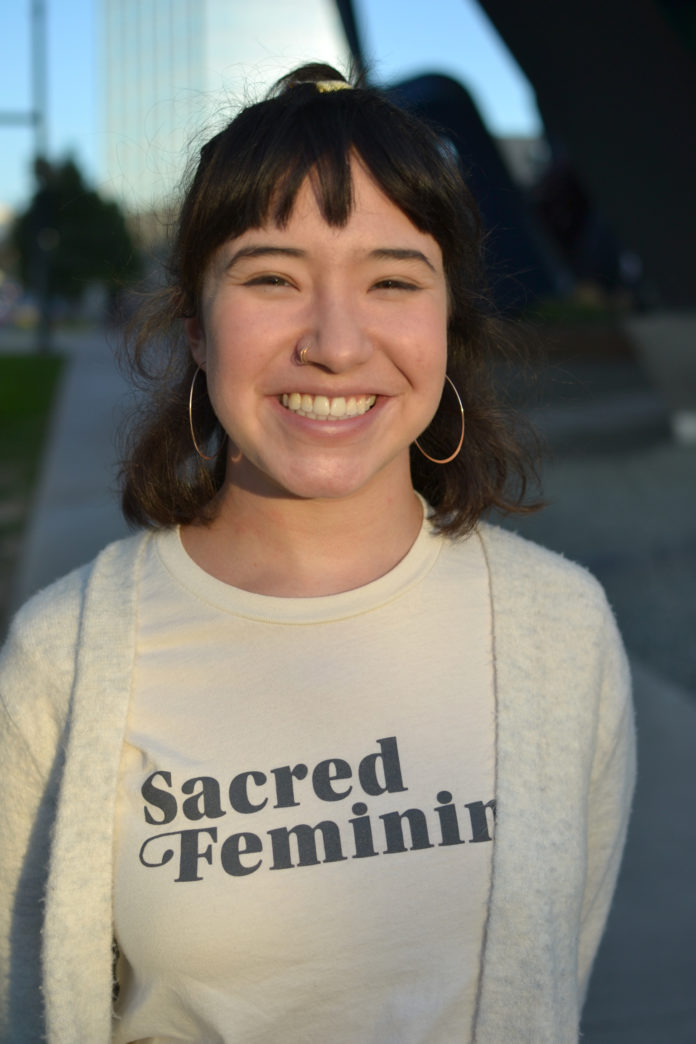By Meg Peck | Contributor
On Wednesday, progressive Christian author, poet and storyteller Kaitlin Curtice spoke during Baylor’s chapel.
As a multiracial woman and citizen of the Potawatomi Nation, Curtice centered her talk around decolonization and balancing her Native heritage with her Christian faith. She began by performing a land acknowledgment to recognize the indigenous people of this area. From there, Curtice explained her upbringing as a biracial person in the Midwest and evangelical church and how she reconnected with her Potawatomi culture later on in adulthood. She discussed how colonization and the removal of the Potawatomi Nation from the Great Lakes to Oklahoma [or the “Trail of Death”] still has repercussions on her people today because of how their history, beliefs and practices have either been erased or stolen.
Not only did Curtice touch on the work of decolonization, but she also commented on topics such as white supremacy and toxic patriarchy. In regard to the latter, Curtice stated, “In the church today, women are not seen as equal to men,” to which a student in the 9:05 audience shouted, “no one even thinks like that!”
At that, my heart stopped. It was like Kathy Khang in the spring 2019 chapel all over again [during which a student yelled as she spoke on privilege].
Throughout the course of Curtice’s entire talk I was on my toes; for while topics like racism and sexism may seem like common knowledge to some, many Baylor students, particularly upper or middle class, may not have had as much exposure to these very real issues.
With bravery, Curtice maintained her composure and continued on with her sermon. She discussed how connecting with God through nature is important to her both as a Native woman and a Christian, and concluded by expressing how we all can do the hard work of decolonizing both with each other and with all of creation, as it is both a communal and individual practice.
At the conclusion of chapel, Ryan Richardson, associate chaplain and director of worship and chapel, reminded students they need to be respectful and if they had comments or concerns they could come talk with chapel staff. He also later tweeted, “Our university supports exploration of faith and life which certainly includes your opposition,” in response to a tweet from Baylor’s Young Americans for Freedom group criticizing the sermon.
After the service, I was able to connect with Curtice, since we had met earlier in 2019. While I was excited to see her, I was also very disappointed with how my fellow students had treated her. Curtice was obviously shaken up, stating, “That’s never happened to me before.” I was devastated to hear that after speaking at countless universities and conferences, Baylor was the first and only place Curtice had experienced disrespect during a talk.
This incident is uncannily reminiscent of last year around this time when Kathy Khang spoke on privilege. In February of 2019, Korean American author and speaker, Kathy Khang, preached from Mark 5 on how the government official Jairus had to wait while Jesus healed the bleeding woman whom he later refers to as “daughter.” The point of Khang’s message was to recognize the varying levels of privilege we each have and how to use it to stand up for the marginalized and oppressed.
In her concluding prayer, also during the 9:05 service, Khang prayed about current events that broke her heart and made her more desperate for Jesus, including the incident where an 11-year-old was arrested for not standing during the pledge, which is when a student heckled her. The student was removed, not because Baylor does not foster free speech, but simply because it is disrespectful to shout at someone when they are speaking, let alone praying.
On its website, Chapel states that it seeks to provide worship and to engage important issues which, at times, can be uncomfortable, but that is no excuse for microaggressions to occur. Disagreeing with a speaker is one thing, but heckling them during their talk is another.
I understand many Baylor students have been brought up in the evangelical church, myself included, but that is simply a way of knowing God, not the way of knowing.
The following morning, in President Livingstone’s weekly email, she commented, “Civil discourse requires mutual respect and objectivity without hostility, while demonstrating an appreciation for the experiences of others even if they do not align with our own personal or institutional values or perspectives. This topic is vitally important for higher education – and especially at Baylor either in Chapel or during class presentations.”
I know both Kaitlin Curtice and Kathy Khang personally, and they are two of the bravest and strongest people I know. It took courage for Curtice, one of the few speakers of color in the past year, to still come knowing what happened with Khang. For this blatant disrespect to occur in almost the same way as before is beyond disgraceful. This should not have happened and cannot happen again.
This has never happened when a white male was speaking. This has never happened when a white woman was speaking. Regardless of the topic. The common denominator in the equation? Both speakers were minority women. This is white supremacy occurring in the exact place it should be combated, and this record of how Baylor students treat women of color who come to speak is not only shameful, but it says, to all speakers of color, they are not welcome here.
Meg is a senior social work major from Colorado Springs, Colo.






